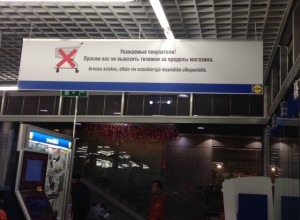 Today, while shopping at my neighborhood grocery store, I noticed this sign for the first time, although it must have been there for at least a couple of months.
Today, while shopping at my neighborhood grocery store, I noticed this sign for the first time, although it must have been there for at least a couple of months.
(I am noticing that the photo is rendered here in a terrible quality. There seems to be some sort of automatic setting on the university blog pages that reduces the quality of images, no doubt to save space. You’ll have to take my word for it that the text in my original photo was actually legible.)
OK, I live in Finland. In downtown Helsinki, to be exact. The two official languages in Finland are Finnish and Swedish. Although it’s hard to make out in this photograph, you can see that the most prominent language on this sign, placed on top, is Russian. There is text in Finnish, as well, but it is much smaller and appears underneath the Russian. It says: “Dear customers, please don’t take shopping carts outside the store area.”
The official message of this sign is pretty basic — mundane, even. But think about the subtext and what it says about the society I live in. The Finnish is there almost as something gratuitous — it’s there because it kind of has to be; it is in Finland, after all. Yet it’s smaller and not prominent: the underlying message is that Finnish people don’t need to be told to not take shopping carts outside. And Swedish speakers? Not a chance! Everyone knows that Swedish speakers don’t shop at Lidl, anyway — they are in their swanky neighborhoods shopping at the Finnish equivalent of Whole Foods or Dean and Deluca, right?
Nor is the sign written in English, which, of course, is the international lingua franca. The underlying assumptions here seem to be that a Russian-speaking customer a) is likely to walk out of the store with a shopping cart, and b) will not understand an admonition not to do so in any language other than Russian.
It would be interesting to know if the Russian text on the sign is actually grammatical, and, if so, if it is pragmatically appropriate for this setting. Is the the language choice on this sign politically correct? That’s a question I can’t even begin to contemplate.
Incidentally, I have actually noticed Russian customers at this particular grocery store, stocking up on staples such as toothpaste and other dry goods. That is a harsh reminder of how politics (ie, the embargo to Russia) affects the everyday lives of people who still need to find a way to keep their teeth clean. And, apparently, that they need a reminder to not take the shopping carts home to Russia with them.